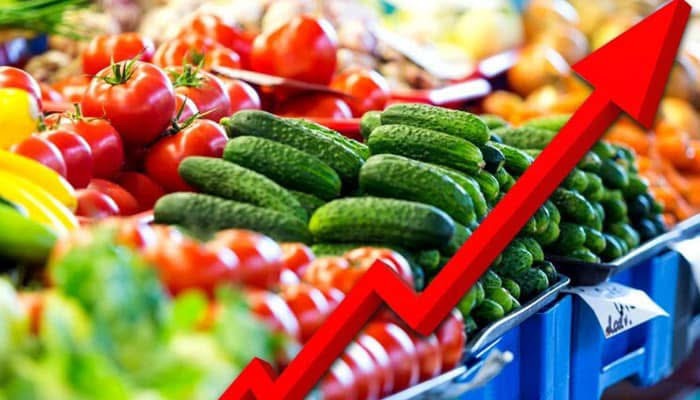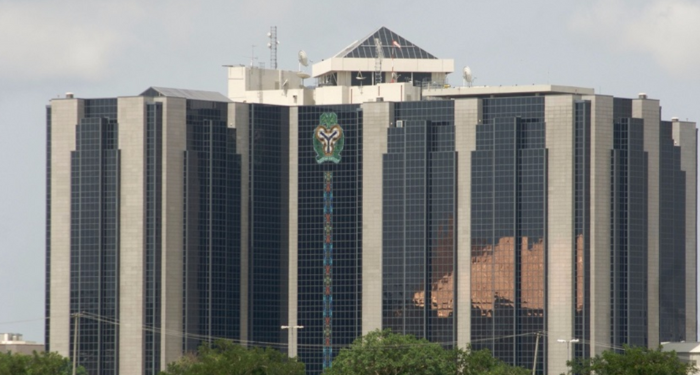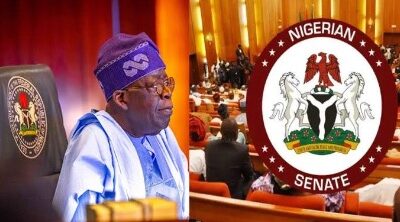Business
Food inflation hits 40% despite FG $3.3bn agric loan

Despite securing multilateral loans amounting to $3.334bn (N5.178tn) and attracting over $4.3bn investments to boost food production, the cost of essential staple food items skyrocketed by 60.88 per cent under the leadership of President Bola Tinubu, The PUNCH reports.
When Tinubu assumed office in May 2023, food inflation was 24.82 per cent. It jumped to about 40 per cent in November 2024. This is based on data from the National Bureau of Statistics.
This is occurring as Nigerians are increasingly struggling to afford basic food items, with many households finding it difficult to make ends meet due to the sharp rise in prices.
This stark increase in food prices stands in contrast to the government’s ambitious efforts to address food security and agricultural development, raising concerns about the effectiveness of current economic policies, the impact of inflation, and the challenges in translating financial support into tangible relief for Nigerians.
Explainer: Guidelines To Actualise Guinness World Record Dream | Punch
Upon assumption of office in May last year, President Tinubu promised to prioritise food availability and security, stressing that the government would cultivate about 500,000 hectares of farmlands to combat hunger in the country.
“I am well aware that for some time now, the conversations and debates have centred on the rising cost of living, high inflation, which is now above 28 per cent, and the unacceptable high under-employment rate.
“To ensure constant food supply, security, and affordability, we will step up our plan to cultivate 500,000 hectares of farmlands across the country to grow maize, rice, wheat, millet, and other staple crops”, Tinubu stated in his new year address amidst other commitments.
However, the spiral increase in transportation costs occasioned by the removal of fuel subsidies, massive devaluation of the naira, and ravaging insecurity have fuelled a rapid increase in the price of all food commodities over 19 months.
Data obtained from the Consumer Price Index report released by the National Bureau of Statistics between May 2023, when Tinubu assumed office, and November 2024 showed that for 14 consecutive months, Nigerians spent increasingly more money each time they visited the market to buy food items.
A breakdown showed that food inflation increased from 24.82 per cent in May 2023 to 25.25 per cent in June, 26.98 per cent in July, 29.34 per cent in August, 30.64 per cent in September, 31.52 per cent in October, 32.84 per cent in November and 33.93 in December 2023.
By January 2024, the price of food items increased to 35.41 per cent and surged further to 37.92 per cent in February, 40.01 per cent in March, 40.53 per cent in April, 40.66 per cent in May, 40.87 in June, before witnessing a drop to 39.53 per cent in July and 37.52 per cent in August due to the harvest season.
In September, the cost of food increased again to 37.77 per cent, 39.16 per cent in October, and 39.93 per cent in November, which is almost 40 per cent.
Despite the challenging situation, checks by our correspondent revealed that the government secured loans totalling $3.334bn, an equivalent of N5.178tn from the World Bank and the African Development Bank under President Tinubu’s administration to enhance agricultural production, adopt innovative farming techniques, and increase food sufficiency for Nigerians.
Analysis showed that $500m was approved by the World Bank for the Livestock Productivity and Resilience Support Project to boost livestock production and food security nationwide.
The Board of the World Bank Group approved a $500m loan to Nigeria last week Friday (December 13, 2024) to boost rural access and agricultural marketing in the country.
According to information obtained from the Washington-based institution, the loan is for the Rural Access and Agricultural Marketing Project—Scale Up.
It is designed to bridge the gap between rural communities and the broader marketplace, facilitating smoother access to agricultural markets, schools, and hospitals and promoting social cohesion among rural populations.
Similarly, the AfDB under the leadership of President Akinwumi Adesina has approved a loan facility worth $2.2bn in capital mobilisation for its transformative Special Agro-Industrial Processing Zones in Nigeria.
He said phase two is set to revolutionize Nigeria’s agricultural sector by creating agro-industrial hubs that drive productivity, enhance food security, raise living standards, and create jobs.
The programme will be implemented in states including Cross River, Imo, Ogun, Oyo, Kaduna, Kwara, Kano, and the Federal Capital Territory and will expand to an additional 24 States in Nigeria in the next three years.
In an interview with PUNCH, Adeshina said its agricultural initiatives would yield about five million metric tons of wheat, rice, cassava, and this year for the country.
Also, a loan of $134m was approved for seeds and grain production in the country in November this year.
A statement by the agriculture ministry said the fund will support farmers across the country to increase production of key staple crops, thereby improving national food security.
Health 360: Sickle Cell Disease
Upon assumption of office in May last year, President Tinubu promised to prioritise food availability and security, stressing that the government would cultivate about 500,000 hectares of farmlands to combat hunger in the country.
“I am well aware that for some time now, the conversations and debates have centred on the rising cost of living, high inflation, which is now above 28 per cent, and the unacceptable high under-employment rate.
“To ensure constant food supply, security, and affordability, we will step up our plan to cultivate 500,000 hectares of farmlands across the country to grow maize, rice, wheat, millet, and other staple crops”, Tinubu stated in his new year address amidst other commitments.
However, the spiral increase in transportation costs occasioned by the removal of fuel subsidies, massive devaluation of the naira, and ravaging insecurity have fuelled a rapid increase in the price of all food commodities over 19 months.
Data obtained from the Consumer Price Index report released by the National Bureau of Statistics between May 2023, when Tinubu assumed office, and November 2024 showed that for 14 consecutive months, Nigerians spent increasingly more money each time they visited the market to buy food items.
A breakdown showed that food inflation increased from 24.82 per cent in May 2023 to 25.25 per cent in June, 26.98 per cent in July, 29.34 per cent in August, 30.64 per cent in September, 31.52 per cent in October, 32.84 per cent in November and 33.93 in December 2023.
By January 2024, the price of food items increased to 35.41 per cent and surged further to 37.92 per cent in February, 40.01 per cent in March, 40.53 per cent in April, 40.66 per cent in May, 40.87 in June, before witnessing a drop to 39.53 per cent in July and 37.52 per cent in August due to the harvest season.
In September, the cost of food increased again to 37.77 per cent, 39.16 per cent in October, and 39.93 per cent in November, which is almost 40 per cent.
Despite the challenging situation, checks by our correspondent revealed that the government secured loans totalling $3.334bn, an equivalent of N5.178tn from the World Bank and the African Development Bank under President Tinubu’s administration to enhance agricultural production, adopt innovative farming techniques, and increase food sufficiency for Nigerians.
Analysis showed that $500m was approved by the World Bank for the Livestock Productivity and Resilience Support Project to boost livestock production and food security nationwide.
The Board of the World Bank Group approved a $500m loan to Nigeria last week Friday (December 13, 2024) to boost rural access and agricultural marketing in the country.
According to information obtained from the Washington-based institution, the loan is for the Rural Access and Agricultural Marketing Project—Scale Up.
It is designed to bridge the gap between rural communities and the broader marketplace, facilitating smoother access to agricultural markets, schools, and hospitals and promoting social cohesion among rural populations.
Similarly, the AfDB under the leadership of President Akinwumi Adesina has approved a loan facility worth $2.2bn in capital mobilisation for its transformative Special Agro-Industrial Processing Zones in Nigeria.
He said phase two is set to revolutionize Nigeria’s agricultural sector by creating agro-industrial hubs that drive productivity, enhance food security, raise living standards, and create jobs.
The programme will be implemented in states including Cross River, Imo, Ogun, Oyo, Kaduna, Kwara, Kano, and the Federal Capital Territory and will expand to an additional 24 States in Nigeria in the next three years.
In an interview with PUNCH, Adeshina said its agricultural initiatives would yield about five million metric tons of wheat, rice, cassava, and this year for the country.
Also, a loan of $134m was approved for seeds and grain production in the country in November this year.
A statement by the agriculture ministry said the fund will support farmers across the country to increase production of key staple crops, thereby improving national food security.
Related News
Food inflation: Imported rice price jumps by 114%
Food inflation: Seven imported wheat vessels arrive Nigeria
Stakeholders warn of higher food inflation in 2025
“The Federal Government has secured a loan facility of $134m from the African Development Bank to help farmers boost seeds and grain production in the country,” the statement read.
The government through the Ministry of Agriculture and Food Security also secured a private-sector investment commitment worth $4.3bn to advance private-sector development in fertiliser production, hybrid seed technology, and agricultural finance.
The partnership with the Fundação Getulio Vargas of Brazil will support one agribusiness in Nigeria’s 774 Local Government Areas with technical and financial resources over the next five years.
The surge in food costs underscores the complexities of managing an economy where external financial assistance and investments have yet to stabilize the market or alleviate the burden on citizens.
Stakeholders wondered the effect of the loans which are to yield expected results and drive down the cost of food items.
Business
IMO OPENS NEW ECONOMIC FRONTIER AS UZODIMMA COMMISSIONS NOVA BANK REGIONAL OFFICE IN OWERRI.

By Prince Uwalaka Chimaroke
16- DEC- 2025
Imo State took another decisive step toward economic expansion on Monday, December 15, 2025, as Governor Hope Uzodimma formally inaugurated the regional headquarters of Nova Bank in Owerri, signalling the state’s growing appeal as an investment destination.
While addressing guests at the commissioning ceremony, the governor noted that deliberate reforms, sustained infrastructural development, and a more business-friendly policy environment have steadily repositioned Imo State to attract credible investors. He described Nova Bank’s choice of Owerri as a strategic endorsement of the state’s economic viability and long-term growth prospects.
Governor Uzodimma praised the Chairman of Nova Bank, Mr. Philip Oduozor, for his experience and leadership within the financial sector, assuring the institution of continued government collaboration. He added that the arrival of Nova Bank, alongside the recent establishment of Access Bank’s regional headquarters in the state, reflects increasing confidence by the private sector in Imo’s economic direction.
Reiterating his administration’s vision, the governor emphasized ongoing efforts to transition Imo from a largely leisure-based economy into a competitive commercial centre. He pointed to significant investments in road networks, security architecture, digital systems, power supply, and overall ease of doing business, while encouraging Nova Bank to expand its footprint in the state, including consideration of Owerri for its corporate headquarters.
In his remarks, Mr. Oduozor explained that Nova Bank, which began operations in 2018 as a merchant bank, has now secured a full commercial banking licence. He stated that the bank intends to play a critical role in financing small and medium-scale enterprises across Imo State and the wider South East region by improving access to credit.
The commissioning ceremony ended with a guided inspection of the new facilities by Governor Uzodimma and top executives of the bank, marking another milestone in Imo State’s economic transformation drive.
Business
Aliko Dangote Reacts to Reports that Donald Trump Is Unhappy With the Launch Of Dangote Refinery (Video)

Alhaji Aliko Dangote, President of Dangote Refinery, has denied claims that U.S. President Donald Trump is displeased with the launch of the $20 billion refinery.
There were claims on social media suggesting that Trump’s recent threat to attack certain locations in Nigeria could be linked to Africa’s largest refinery.
Trump had threatened to strike terrorists targeting Christians at various locations in Nigeria, which led to the spread of various propaganda and social media reactions.
Addressing the press, Dangote said that the USA has been a major supplier of crude to the refinery, adding that the talk about Trump being angry over its establishment “does not hold water.”
“The US has been one of our major suppliers of crude, which is why when someone says Trump is not happy with our refinery, it’s not true,” he said.
“Trump is more than happy with our refinery, because on average for a year, we do not buy more than 100 million barrels from the US.”
Dangote also said Nigerians now have the option of buying high-quality, locally refined petrol at a cheaper price or opting for blended imported fuel at a higher cost.
Dangote stated that fuel importers could continue to incur losses while Nigerians enjoy more affordable petrol prices.
According to him, the availability of locally refined petrol gives consumers a clear choice between quality fuel sold at a lower rate and blended premium motor spirit (PMS) sold at higher prices by importers.
https://www.instagram.com/reel/DSR-Ew5glpI/?igsh=MWxwYWJxcXhoYm51MQ==
Business
CBN returns to S4 platform for N365 billion T-Bills Auction

The Central Bank of Nigeria (CBN) has reverted to the use of its Scruples Securities Settlement System (S4) for the electronic submission of Treasury Bills auction bids, following a brief suspension after its initial test-run in November.
Ekwutosblog understands the system was suspended following a glitch, which has now been resolved.
The latest move comes ahead of a N365 billion Treasury Bills auction scheduled for Thursday, December 17 – 18, 2025, reinforcing the apex bank’s resolve to tighten controls, enhance transparency and improve price discovery in the primary fixed income market.
The bids are to be submitted on Wednesday, December 17, 2025, while successful bidders will be required to settle their obligations on Thursday, December 18.
Market participants see the decision as a signal that the CBN is pressing ahead with reforms despite earlier operational inconsistencies. According to Mr. Tajudeen Olayinka, CEO of Wyoming Capital Partners, the move signals a renewed push for transparency in primary market auctions as the apex bank advances fixed income reforms.
Auction Details: N365 billion across three tenors
According to auction guidelines issued last weekend, the CBN will offer a total of N365 billion across three short-dated tenors:
- 91-day bills: N100 billion
- 182-day bills: N100 billion
- 364-day bills: N165 billion
The auction will be conducted using the Dutch auction system, with bids to be submitted exclusively via the S4 web interface between 8:00 a.m. and 11:00 a.m. on Wednesday, December 17, 2025.
Each bid must be made in multiples of N1,000, subject to a minimum subscription of N50.001 million, while successful bidders are required to settle by 11:00 a.m. on Thursday, December 18.
Second attempt after November test-run
This December auction marks the second activation of mandatory S4 usage, following the first implementation at the November 20, 2025 Treasury Bills auction, when the CBN raised over N700 billion.
Although the S4 system was briefly suspended in subsequent issuances—where bids were routed through Money Market Dealers (MMDs)—sources close to the apex bank said the pause reflected a work-in-progress transition, not a policy reversal.
Nairametrics gathered that the CBN expects to conclude the reform process before year-end, after which S4 will become fully operational for all government securities.
CBN seeks visibility, not market takeover
Speaking at a Premium Times Academy workshop in Lagos recently, Mr. Zeal Akariwe, CEO of Graeme Blaque Advisory, said the CBN’s objective is real-time visibility, not a takeover of the control of the fixed income market.
“Did CBN take over? No. What the CBN wants is transparency and visibility over the market, not takeover. That visibility did not exist,” Akariwe said.
Akariwe, whose firm provides advisory services to CBN, stressed that the Securities and Exchange Commission (SEC) remains the statutory regulator, while the CBN’s actions are corrective measures to address structural weaknesses in the market.
Why transparency matters to CBN
Akariwe highlighted how loopholes in the old system enabled profit concealment. He cited cases where banks and pension funds routed bond trades through brokers to hide gains from regulators.
In one illustration, Akariwe said a pension fund holding a 10% coupon bond bought at N100 could sell via an intermediary at N120, allowing the N20 profit to be shared discreetly among parties without regulatory visibility. “The CBN says we can’t have this where we cannot see it,” he noted.
Concerns had earlier emerged over inconsistent use of issuance platforms, with some auctions conducted via S4 and others through MMDs. Akariwe acknowledged this but described it as part of a transition phase.
Beyond auctions, the S4 rollout aligns with Governor Olayemi Cardoso’s broader reform agenda, spanning financial markets, banking supervision, compliance, and FX reforms, aimed at embedding transparency-driven systems that outlast the current administration.
With the return to S4 for the December auction, the CBN appears set to make electronic bidding the new normal in Nigeria’s government securities market.
-
Business1 year ago
US court acquits Air Peace boss, slams Mayfield $4000 fine
-

 Trending1 year ago
Trending1 year agoNYA demands release of ‘abducted’ Imo chairman, preaches good governance
-

 Politics1 year ago
Politics1 year agoMexico’s new president causes concern just weeks before the US elections
-

 Politics1 year ago
Politics1 year agoPutin invites 20 world leaders
-

 Politics1 year ago
Politics1 year agoRussia bans imports of agro-products from Kazakhstan after refusal to join BRICS
-
Entertainment1 year ago
Bobrisky falls ill in police custody, rushed to hospital
-
Entertainment1 year ago
Bobrisky transferred from Immigration to FCID, spends night behind bars
-
Education1 year ago
GOVERNOR FUBARA APPOINTS COUNCIL MEMBERS FOR KEN SARO-WIWA POLYTECHNIC BORI













